Ghana’s downstream petroleum sector is witnessing mixed Fuel price adjustments at the pumps, as Oil Marketing Companies (OMCs) respond to volatile global oil prices, cedi depreciation, and domestic policy uncertainty.
While some OMCs have marginally reduced petrol prices, others have raised them alongside diesel, citing cost pressures and fluctuations in international benchmarks.
GOIL, Ghana’s leading state-owned fuel retailer, revised its fuel prices with a reduction in petrol prices and an increase in diesel rates.
“A litre of petrol is now selling at GH₵12.07, down from GH₵12.38, while diesel has risen to GH₵13.20, up from GH₵12.88 quoted in mid-June.”
GOIL

Similarly, Shell Ghana adjusted its prices upwards, with petrol increasing to GH₵12.08 from GH₵11.98 and diesel climbing to GH₵13.25, compared to GH₵12.85 on June 16.
In contrast, Star Oil implemented price cuts, selling petrol at GH₵10.67, down from GH₵10.99, and diesel at GH₵12.87, slightly lower than the previous GH₵12.13. In a statement, the company said: “These changes reflect current trends in world market prices of gasoline and diesel.”
PETROSOL took a more conservative route, listing petrol at GH₵11.98 and diesel at GH₵13.98, reflecting the firm’s import dynamics and stock levels.
CBOD Forecasts Price Hikes for Early July

The Chamber of Bulk Oil Distributors (CBOD), in its latest fuel price forecast titled “Market Outlook – 1st to 15th July 2025 Pricing Window,” predicted a sharp rise in both petrol and diesel prices.
According to CBOD, average ex-pump petrol prices are expected to climb from GH¢12.50 to GH¢13.18 (a 5.44% increase), while diesel could rise from GH¢12.50 to GH¢13.23 (a 5.84% increase).
Liquefied Petroleum Gas (LPG) is also projected to increase by around 3.5%, reaching GH¢12.37 per kilogram from GH¢11.95.
The forecast highlighted that pricing adjustments by OMCs will vary depending on factors such as import timing, supplier agreements, and existing inventory levels.
Global and Local Drivers Behind the Price Volatility

One of the primary drivers of the recent fuel price hikes is the significant increase in Brent crude oil prices, which increased from an average of $81.60 per barrel to $84.82—a 3.95% jump.
“This escalation is largely due to intensifying geopolitical tensions in the Middle East, particularly between Iran and Israel.
“The conflict heightened supply chain vulnerabilities across the oil-producing region, pushing up global oil prices through an added risk premium.”
Chamber of Bulk Oil Distributors (CBOD)
Another contributing factor is the slight depreciation of the Ghanaian cedi against the US dollar. During the period under review, CBOD noted that the exchange rate moved from GH¢13.39/$ to GH¢13.43/$.
Although the change appears minimal, it has a direct impact on the cost of importing petroleum products, which are priced in dollars. This depreciation places additional pressure on fuel prices at the pump.

“Rising international prices for refined petroleum products are also playing a key role in driving up costs.”
Chamber of Bulk Oil Distributors (CBOD)
According to Platts data, petrol prices increased by 5.83% (from $812.25/MT to $859.60/MT), diesel by 4.99% (from $719.60/MT to $755.50/MT), and LPG by 3.30% (from $487.73/MT to $503.81/MT).
These upward movements in global benchmark prices are directly influencing the final landed cost of fuel in Ghana, and ultimately, the prices consumers pay.
Lastly, uncertainty surrounding domestic tax policy, especially the potential reintroduction of the suspended GH¢1 Energy Sector Shortfall and Debt Repayment Levy is adding to market volatility.
Although the levy was put on hold in June, speculation about its return created a climate of unpredictability. “Policy predictability is key,” the CBOD emphasized, noting that a clear and consistent tax framework is essential for maintaining fuel supply stability and shielding consumers from unnecessary price shocks.

OMCs are cautiously adjusting their prices, balancing between import costs, political sensitivities, and competitive pressures. The variations across pump stations also reflect differences in supplier contracts and hedging arrangements.
Ghana’s fuel market remains in a state of flux, with price disparities across OMCs reflecting the broader volatility of global oil dynamics and domestic fiscal policies.
As petrol prices dip slightly at some pumps and diesel costs climb across the board, both consumers and regulators will need to monitor developments closely.
Clarity in government tax policy and resilience in currency performance will be crucial to stabilizing fuel costs in the months ahead.
READ ALSO: Mastercard and Access Bank Unveil Innovative Age-Segmented Card to Empower Ghana’s Youth























